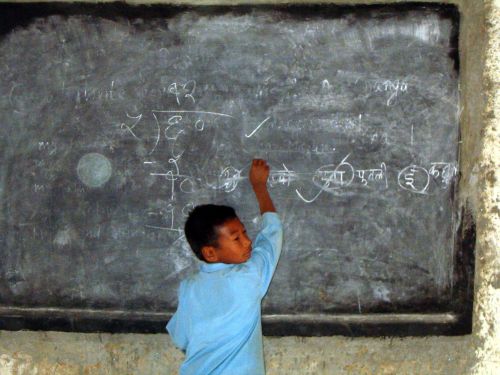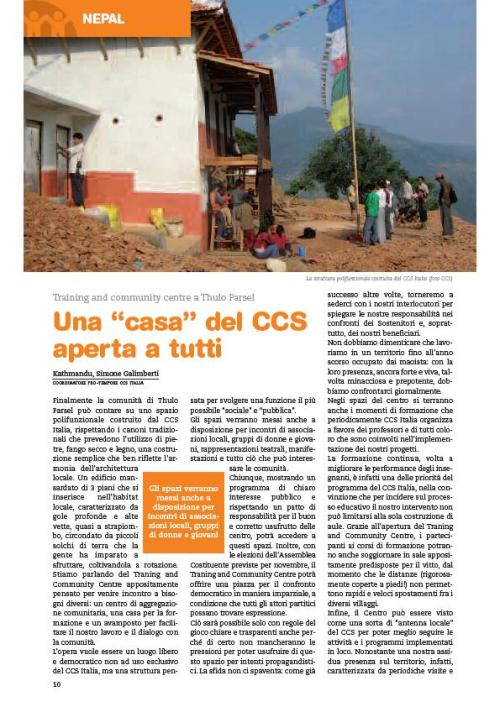 The Ministry of Education has been telling the public that there are 60,000 vacancies for teachers in schools. But there are more than 300,000 people with valid training certificates and teaching licenses waiting for an opportunity to serve as teachers. School education, in Nepal, remains dismal also because of unnecessary government intervention in educational establishments from time to time. Last year, the government decided to recognise ten months’ training after SLC as equivalent to grade 11. Moreover, they have also announced that ten months’ training after grade twelve will be considered equivalent to B.Ed first year. At a time when the undergraduate degrees in most countries across the globe require four years of study, the government seems ready to award B.Ed degree in two years’ time
The Ministry of Education has been telling the public that there are 60,000 vacancies for teachers in schools. But there are more than 300,000 people with valid training certificates and teaching licenses waiting for an opportunity to serve as teachers. School education, in Nepal, remains dismal also because of unnecessary government intervention in educational establishments from time to time. Last year, the government decided to recognise ten months’ training after SLC as equivalent to grade 11. Moreover, they have also announced that ten months’ training after grade twelve will be considered equivalent to B.Ed first year. At a time when the undergraduate degrees in most countries across the globe require four years of study, the government seems ready to award B.Ed degree in two years’ time
Worse still, the training contents and methodology at the Education Training Centres (ETCs) are below par as com pared with the academic ones. This will only produce incompetent and unskilled teachers but also have an impact on the quality of students produced. In our own neighbouring countries, a primary school teacher requires a Bachelor’s degree plus a year or two years’ training. In our context, SLC pass-outs fulfil the minimum qualification for teachers of primary schools. The School Sector Reform programme envisages 12 years of schooling as minimum qualifications for the primary school teachers. On the pretext of upgrading the qualifications of teachers, the Ministry of Education (MoE) has made a wrong decision to equate the ten months’ training with academic degree.
As per the government provisions, aspiring teachers are required to sit for exams that certify them to be allowed to work as teachers. However, it is also true that the government has distributed teachers’ licences to all and sundry, without actually assessing the qualifications and performance of the candidates. It should be noted that only such candidates, who have undertaken trainings, are qualified to sit for teacher’s examinations. That means licensing examination is the second layer of quality control. Recently, Education Minister Renu Yadav announced that the Ministry of Education has decided to scrap the teachers’ licensing examinations. If implemented, this will be another erroneous and irresponsible move that will still degrade the educational system.
From an article of Dr. Mana Prasad Wagley
Tag Archives: project
about quality in education
Filed under nepal
The strange story of a training center
We received
Dear Friends
I came in 2005 in Nepal to visit CCS Nepal projects places and I was really happy to see how they worked for the benefits of children and community we sponsored from Italy.
Now on the web I read about a strange story related to the Training Center built in Thulo Parsel. It seems that what has been written in the house magazine of Centro Cooperazione Sviluppo ONLUS (Progetto Solidarietà –http://www.ccsit.org/archives/docs/pages/jchia47b-PS2007-3.pdf) , it is not true.
They wrote to italian sponsors of the association they built the Center so “Finalmente la comunità di Thulo Parsel può contare su uno spazio polifunzionale costruito dal CCS Italia”. In September 2007 (translation: Finally the community of Thulo Parsel has a multi -function space built by CCS Italy)
They wrote the Center has been paid by CCS Italy INGO but on the web it seems it has been paid by a local farmer. So I like to ask you what it is true and why they wrote so to italian sponsors of the organization.
With friendly regards
Claudio Parodi-Italy
Dear Friend
in 2006 CCS Italy decided to built the Training Center in Thulo Parsel, in order to train teachers and people directly in the community. CCS Nepal, signed an agreement with a local farmer, it stated: CCS Nepal have free use of the land for 15 years and after that time (if no further agreement will be signed) the building will be property of the land owner.
In may 2007 CCS Nepal (and community) finished the building and it started to be used by teachers and people but at the end of 2007 Centro Cooperazione Sviluppo INGO changed idea with no reasonable explanations. So they ask the farmer to give back the cost of the building. All people were surprised and shocked by this negative approach. The farmer decided to avoid problems and gave back around 9 lacks (euro 9.000) spent for the construction with some problems due to the high amount.
It is quite surprisingly to hear by you that Centro Cooperazione Sviluppo ONLUS which not paid the Center market it to italian sponsors. But as you could see in other posts, since 2007 the new officers of the INGO have not a correct attitude towards community and people involved in the Timal projects and most of them has been stopped or reduced.
In 2006 CCS Nepal decided as primary activities for 2007 to enforce quality education in the ECDs, primary and secondary schools supported in Timal area. So they need a place where to held trainings and courses avoiding to stop the regular lessons in the schools. Of course the building could be used by community or other organizations working in the area.
Filed under aid industry, nepal
Activities Progress Report 2007-2008
 It is available the Report of CCS Nepal NGO 2007-2008: (PDF file)
It is available the Report of CCS Nepal NGO 2007-2008: (PDF file)
activities progress_report_2007-2008
Filed under aid industry, nepal
Our story
 In 2003 some italian volunteers, Barbara, Enrico, Fabio, reached after a long walk Thulo Parsel. They met Salam, Dhane and other local people who were already working in small projects for improving education in the area.
In 2003 some italian volunteers, Barbara, Enrico, Fabio, reached after a long walk Thulo Parsel. They met Salam, Dhane and other local people who were already working in small projects for improving education in the area.
The volunteers started to sponsor around 300 children in Kali Devi, Shree Mangkal, Bal Bikas), all primary schools located in the VDC of Thulo Parsel (Timal, Kavre District). Now we are working in six VDCs in Timal: Bolde, Sarsyurkarka, Meche,. Narayansthan, Chapakori.
The idea was to support children and family giving them educational materials, aid in emergency and, in the same time, to help schools providing teachers and didactic tools. It seems a little project but the italians found an italian ONLUS and the number of sponsored children steeply increased as well the project which was extended to create ECDs, and to create an health system.
Now under the program there are more than 3000 children. Enrico became Country Director of the italian ONLUS and we formed CCS Cooperation and Development Nepal local NGO, all people were Tamangs from the area of the project.
We had a goal not to duplicate projects and activities of other INGO but to have a new approach and new practices.
From the beginning we worked in strict relation with the community, we had several meetings in the schools to explain the project and the future, when we built the first school the community participated with at least 30% of volunteer work or money. Then we built other 4 schools with the same approach.
The fund were directly remitted in the school bank accounts to pay teachers, to built infrastructures (rooms, wall, etc,) to buy didactical tools, etc. This happen even we reach 35 schools supported with more than 115 teachers supported by us.
Each year, in baishak, when the schools reopened we had community auditing where the SMC members explained to all people how they spent the fund given during the year to the school. All new projects and activities has been debated in the villages of the project from the beginning. We worked there during the conflict thanks to this approach and transparecy.
In the middle of 2003 we started building the first school: Bal Bikas pimary in Thulo Parsel. (work concluded in the first half of 2004).
Filed under Uncategorized














